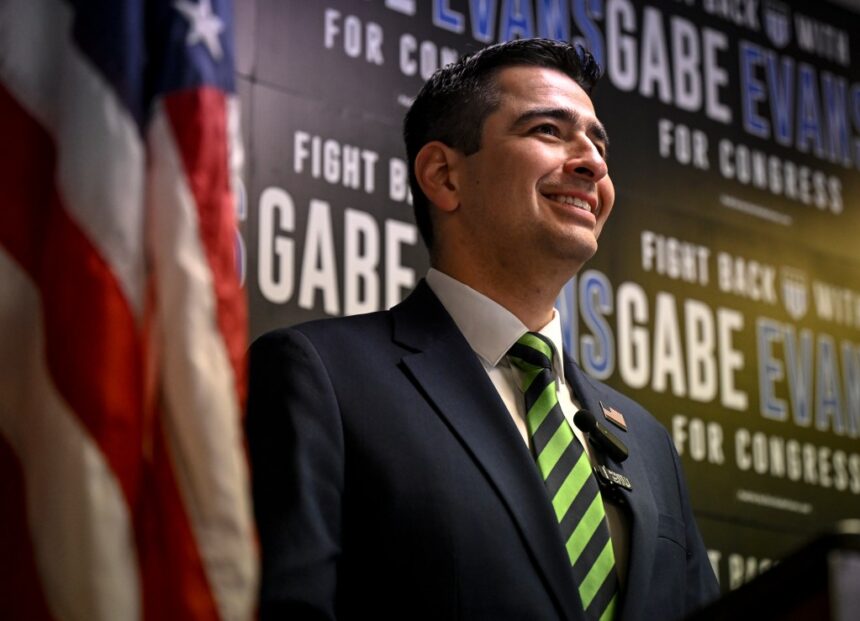More than $80 million was spent on Colorado’s eight congressional races this election cycle, final campaign filings and independent spending reports show — but that money wasn’t spread evenly across the districts.
The closely fought 8th Congressional District, where Republican state lawmaker Gabe Evans unseated incumbent Democratic U.S. Rep. Yadira Caraveo by less than 2,500 votes, accounted for nearly half of the total spending — $40 million total. Of that, $29 million was spent by outside groups in the 8th, which covers the north Denver suburbs up through Greeley.
It was one of the 10 most expensive congressional races in the country, according to campaign finance tracker OpenSecrets.org.
Much of the remaining money focused on the Western Slope-based 3rd Congressional District, where Democrat Adam Frisch nearly unseated Republican Rep. Lauren Boebert in 2022 but faced a new GOP nominee this time, and the Eastern Plains’ 4th Congressional District. That traditionally ruby-red Republican district is where Boebert ran in this cycle. Campaigns filed their post-election reports by Thursday night with the Federal Election Commission.
In the 8th District, the spending showed a clear tilt toward Caraveo, the incumbent in the state’s newest seat. Her campaign directly spent more than $8 million, records show, while outside groups spent more than $16 million to either boost her or tear down Evans.
In all, more than $151 was spent for each of the 160,871 general election votes she received.
Evans spent more than $2.5 million directly, while another $13 million was spent by outside groups — or about $96 total for each of his 163,320 votes.
“Gabe Evans was the only candidate in the country to beat a Democrat incumbent in a state Kamala Harris won because we ran a disciplined campaign with the best candidate in the country,” Evans campaign spokesperson Tyler Moore said in a statement Friday. “Despite being massively outspent, Gabe’s message as a cop, soldier, husband, father and Latino resonated with everyday Coloradans who want good jobs, affordability and safe communities.”
Caraveo’s campaign did not respond to a request for comment.
The flipped seat will split Colorado’s congressional delegation between four Democrats and four Republicans, despite the state’s distinctly blue shift in recent elections. It also will give Republicans a slight buffer in Washington, D.C., where the party will enter the next term with a 220-215 seat majority in Congress.
The 8th District is one of the most competitive in the nation, and the political parties and House leadership spent like their potential majorities depended on it.
The Congressional Leadership Fund, a Republican-affiliated super PAC, and the National Republican Congressional Committee spent a combined $9.6 million to boost Evans’ campaign. The House Majority PAC, Democrats’ super PAC, and the Democratic Congressional Campaign Committee likewise combined for about $8 million to support Caraveo.
The partisan groups were four of the top five outsider spenders. The pro-cryptocurrency political action committee Fairshake rounded out the top five, with about $2.2 million spent to boost Caraveo.
Lopsided money in 3rd District
The next-costliest race was the 3rd Congressional District, which swoops from the northwest corner of the state down to Pueblo. That spending was almost singlehandedly driven by Frisch’s eye-popping haul following his near-win over Boebert in 2022.
He spent nearly all of his $18 million bankroll in this cycle trying to get over the finish line after Boebert switched districts in late 2023 — aided by about $649,000 in outside money. That total spending was about 4.5 times the campaign and outside spending on behalf of Republican Jeff Hurd.
Hurd won the Republican-leaning district by about 19,800 votes, or about 5 percentage points.
In all, spending by or to support Hurd amounted to about $20 per general election vote (though he also faced a competitive primary, which accounted for some of the spending). Spending by Frisch or to support him amounted to about $102 per general election vote.
The results show that “you’ll never be able to purchase an election” if voters don’t trust the candidate’s authenticity or their party, said Nick Bayer, a spokesperson for Hurd’s campaign, in an email Friday. Frisch’s campaign did not respond to a request for comment.
“We always knew we were going to be grossly outspent, so we had to rely on Jeff’s extraordinary work ethic to be everywhere,” Bayer said. “Our team was lean and smart in any expenditure we made, and community leaders and local party organizations stepped up big time to help us get our message out.”
Spending in Boebert’s race
Meanwhile, the money followed Boebert in her move to the northern Front Range to run for the 4th District seat. She reported spending more than $5.6 million this election cycle, including to win a six-person primary race in June. Most of Boebert’s reported spending happened before the homestretch of the campaign this fall.
Trisha Calvarese, who won a three-person Democratic primary in June, saw her fundraising and — correspondingly — spending take off after Boebert won the Republican nomination. Calvarese ended up spending about $4.1 million, almost all of it after the primary, to contest the most Republican district in the state.
Boebert spent about $1.1 million in that time, according to her campaign finance reports. Boebert won the seat by more than 50,000 votes, or about 11 percentage points. Her campaign declined to comment Friday.
Including outside spending — which was much lower than in the 8th District — about $23.72 was spent by or in support of Boebert for each general election vote she won. Total spending amounted to $23.45 per vote for Calvarese, who received more outside support.
Calvarese highlighted that she outran the last Democrat to vie for the seat — Ike McCorkle lost to former U.S. Rep. Ken Buck by 24 percentage points in 2022 — and called herself “humbled, grateful and inspired by the might of us ordinary people and a growing labor movement.”
“In a cycle where nine out of 10 U.S. counties shifted red, Boebert had to spend big in the reddest district in Colorado,” Calvarese wrote in a text message. “Why? Because hardworking people invested in the idea of a representative from the district dedicated to doing the hard work of Congressional casework instead of self-promotional crap like Cameo.”
Money spent to win each vote
Here’s a breakdown of the equivalent direct spending per general election vote earned by major congressional campaigns in Colorado in the 2024 cycle. The figures do not include outside spending, unless otherwise noted. In some cases, candidates faced primary elections that would have contributed to spending throughout the cycle.
1st Congressional District: Rep. Diana DeGette (D, winner): $4.42; Valdamar Archuleta (R): $0.14.
2nd Congressional District: Rep. Joe Neguse (D, winner): $8.08; Marshall Dawson (R): $0.21.
3rd Congressional District: Adam Frisch (D): $98.08; Jeff Hurd (R, winner): $13.46.
4th Congressional District: Rep. Lauren Boebert (R, winner): $23.46; Trisha Calvarese (D): $21.73.
5th Congressional District: Jeff Crank (R, winner): $4.67; River Gassen (D): $1.05.
6th Congressional District: Rep. Jason Crow (D, winner): $9.78; John Fabbricatore (R): $2.14.
7th Congressional District: Rep. Brittany Pettersen (D, winner): $8.11; Sergei Matveyuk (R): $0.22.
8th Congressional District: Rep. Yadira Caraveo (D): $50.33; Gabe Evans (R, winner): $15.51. (Including outside spending, totals were $151.25 for Caraveo and $96.48 for Evans. The race was one of the most heavily contested in the country.)
Source: Federal Election Commission filings.
Stay up-to-date with Colorado Politics by signing up for our weekly newsletter, The Spot.










